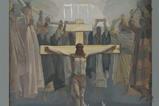Elaine Storkey looks at some of the ways women have tried to emphasise God’s female attributes, but asserts he cannot be described by our understanding of gender
Some years ago in America, I was at an international women’s conference on the Holy Spirit. Only three out of 400 of us came from the UK. The rest were from the American continents, Australasia and Asia, with a very large contingent from countries across Africa. It was unlike any women’s conference I had been to before.
Quite soon it became evident that the week was to be given to feminising every aspect of the Christian faith and celebrating the centrality of women. In some ways this was liberating. Women found their own voices and felt free to share with others without fearing correction. They could retell the stories in the Bible from a female perspective and grow in confidence as women. Yet, in other ways it was not liberating, for the underlying theology slowly became dissociated from the biblical picture. The week concluded with a strange celebration of communion where we prayed to “Mother Earth, who grants us life”, commemorated “Christa, who gave her body and blood for us” and called upon “Sophia, the Holy Spirit, who empowers us with wisdom”.
From day one it became clear that the American women who were leading the gathering were very much out of sync with most of the delegates from the global South. Murmurings of dissent were evident throughout, with some excellent presentations from Chinese and Latin American speakers as an antidote. But during communion, as the leader began to intone a liturgical prayer, over 200 women rose together to exit the auditorium. As they were mostly in national dress, it was impossible to ignore the fact that the majority were not from the West. The conference convenor stopped the service and, in a hurt and puzzled voice, asked why people were leaving. One prominent African lawyer turned round and spoke for them all. “Sisters, in our cultures we left paganism and animism behind to follow Jesus. We’re not prepared to return to idolatry now.” As they left, many Europeans joined them, and the service concluded in disarray.
What went wrong?
The motivation of empowering women was a good one. The invitation to read scripture from women’s own experience was very helpful. The careful inclusivity of faith language, especially for the Holy Spirit, was liberating for women who had struggled with male pronouns and male images all their lives. But the African women were right. The undergirding theology was no longer Christian. It was not a celebration of Christian women’s freedom from bondage, through the redemptive love of Jesus. It was instead a dramatic and deliberate embrace of the ‘Ultimate Feminine Principle’, which the organisers believed lay at the heart of all reality. For them, this was manifest through the power of the Holy Spirit, now identified as ‘Sophia’.
It’s easy to understand where this came from. The desire to challenge the perception that God is male had led them to steer away from the language of ‘Father’ and ‘Son’ to focus on the third person of the Trinity. The language of the Hebrew scriptures helped, as the Hebrew word for Spirit (ruach) is feminine. At the very beginning of the Old Testament, in the account of God’s creation (Genesis 1:2) we read that the “Spirit of God was hovering over the waters.” Many commentators liken this to a bird hovering over a nest, preparing for new life. Later, Isaiah sees the same Spirit (ruach) resting on God’s anointed one, in his prophesy about the coming Messiah. Here, God’s Spirit is identified as “The Spirit of wisdom and of understanding, the Spirit of counsel and might, the Spirit of knowledge and fear of the Lord” (Isaiah 11:2). The fact that all these are attached to a feminine noun can give women a greater sense of confidence and inclusion.
The link between wisdom and the Holy Spirit appears again in Proverbs, where wisdom is personified and referred to as female. We’re urged to search for her; she’s beyond material value and the one who finds wisdom is blessed. “Blessed are those who find wisdom, those who gain understanding, for she is more profitable than silver and yields better returns than gold. She is more precious than rubies; nothing you desire can compare with her” (Proverbs 3:13-15). A few chapters later, wisdom is personified even more, and speaks for herself. She describes how she was at the beginning of creation: “when [God] marked out the foundations of the earth. Then I was constantly at his side. I was filled with delight day after day, rejoicing always in his presence” (Proverbs 8:29-30).
Through the ages, many theologians have seen the feminine linguistic identity of the Spirit as significant. Early Christian Syriac writers often used maternal images when they spoke of the Holy Spirit, for the Syriac word for Spirit (rucha) is also feminine. Other theologians have often focused on the Greek translation of the Hebrew word for wisdom in Proverbs (Chokmah, translated Sophia) and have personified the Holy Spirit as Sophia – a female identity within the Trinity. This was how the women’s conference I attended had begun in their re-imagining of God. Sophia represented divine power that was female and liberating. But, for them, she was also a route into new paganism.
How can we think in a biblical way about the gender of God?
It’s undeniable that historically we have often been given a picture of God which highlights maleness, and the attributes that go with that. God is often presented as king, warrior, shepherd, leader, along with male-associated imagery conveying authority, power and provision. Even the familial concepts of Father and Son have gender connotations, so it’s easy to understand the motivation of women who want to highlight a feminine Holy Spirit. However, any gendering of God, whether male or female, is ultimately based on misunderstanding the limitations of human language.
When the Bible speaks of God as ‘he’ it is not making a point about God’s gender. It is simply referring to God in personal terms. It lets us know that the Creator God who brought the world into existence is not some abstract power but a personal Being in relationship with creation, including with us as the human creation. The problem is how to express all this in words. We have to use words that make sense to us as human beings, so we use figurative language that gives us metaphors for God, pictures that show some aspect of what God is like. We also use personal pronouns which are mostly gendered – either masculine or feminine. But God is beyond sex and gender; Godself is neither male nor female. Sexuality is what God has put into creation, and Jesus’ sexuality reflects his earthly humanity, not his divinity. Yet even then, Jesus came to identify with us all, not just with one sex. In both his birth and atoning death, Jesus represented women and men alike. (The Greek word is useful in understanding this. It is anthropos (human being) not aner (man.) In his incarnation Jesus was the word made flesh, not the word made male.
The careful inclusivity of faith language was liberating for women who had struggled with male pronouns and male images all their lives
In a similar way, the Holy Spirit is neither male nor female, but can be imaged or pictured in both. Picturing the Spirit as flames of fire, or a mighty wind, gives us some sense of the Spirit’s power. Personifying the Holy Spirit as a dove shows us the Spirit’s gentleness. Hearing the Spirit in the ‘still small voice’ or asking God for the gifts of the Spirit brings us into a deeper relationship with God and imparts wisdom and empowerment. But the activity of the Spirit doesn’t need to be defined in gender terms.
The route forward, and away from the fixation that God is male, is not to turn the Holy Spirit into a female part of God, nor to elevate women’s spirituality as somehow divine. It is rather to explore the variety of images in scripture and enrich our metaphors about God. We already know the ones that signify God’s power and protection: God is our rock, shield, hiding place, fortress, anchor, stronghold. We know those that give revelation: God as light, voice, breath, wind. But we can celebrate those that reflect God in female ways – an eagle hovering over her young, encouraging them to fly, and spreading her wings to catch them if they fall (Deuteronomy 32:10-12). Or a mother bird, sheltering her chicks under her wings (Ruth 2:12). Or Jesus as the loving mother hen (Matthew 23:37). And how often do we hear the human maternal metaphors where God is like a woman in childbirth (Isaiah 42:14), a mother comforting her child (Isaiah 66:13) or where God even has a womb which gives birth to the ice and frost (Job 38:29)? Now that’s surely worth thinking about!


































2 Readers' comments